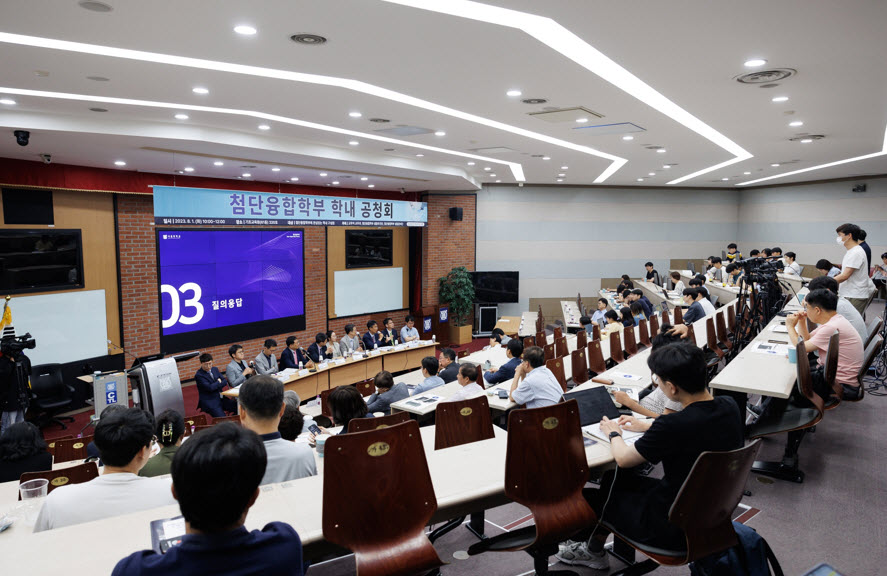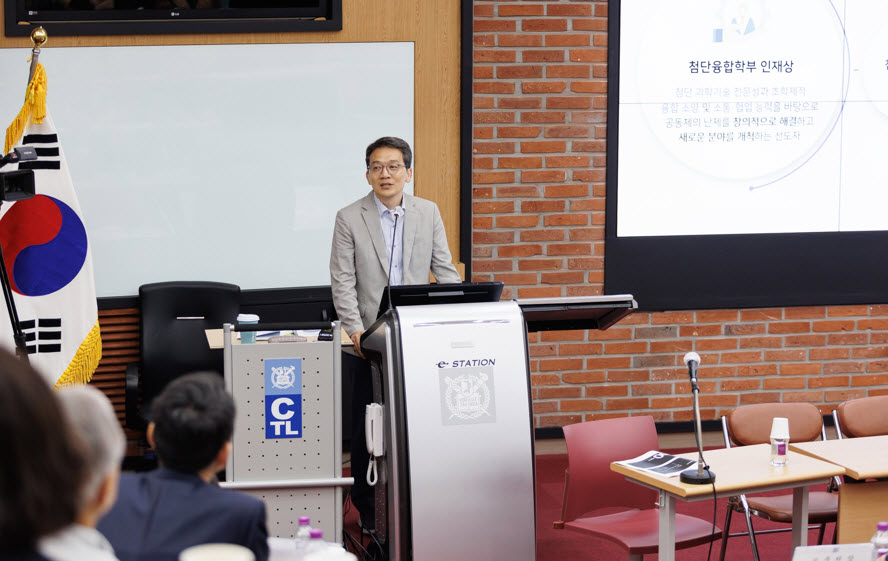
A public hearing on the establishment of School of Transdisciplinary Innovations
On August 1, a public hearing on the establishment of School of Transdisciplinary Innovations took place at the SNU Faculty of Liberal Education. In a sign of significant interest in the new school, the hearing, which was held in hybrid format, drew more than 250 participants. Organized to outline the operation and curriculum of the new school and gather feedback, the event introduced the objectives of the new school and the curricular designs of each of its five constituent programs.
The hearing began with opening remarks by Kim Seong-Kyu, the Executive Vice President for Academic Affairs & Dean of the Graduate School. Kim stressed the importance of establishing the new school, adding, "This school will function as a framework for convergence among its five constituent programs. Through this hearing, we hope to further refine the school’s curriculum."

Song Jun ho, head of the preparation committee for the school, introduced the overall operation plan.
Lee Jihyun, the Deputy Vice President for Education, spoke about the background of the establishment of the school, while Song Jun ho, head of the preparation committee for the school, introduced the overall operation plan. "The establishment of this school reflects social demand for fostering high-tech talent, particularly in this 4th industrial revolution era," said Lee. "In this spirit, the school will not predetermine the enrollment size for its five programs. Instead, we will encourage students to freely choose their own courses of study." "The school attempts to realize transdisciplinary convergence among diverse fields and aims to develop students' creativity and problem-solving skills," Song said. Experts from various professional fields will be invited to promote an educational environment that can substantively help students. Building 18 will serve as the main location for the new school. Song continued, "This new school will focus on developing students' understanding of the impact of advanced science and technology and related ethical challenges. It seeks to enhance students' problem-solving abilities through the use of convergent technology."
Professor Kim Joohyung (Department of Political Science and International Relations) introduced plans for general education components of the school's curriculum. He emphasized the importance of general education, noting a global trend in strengthening it. The general education courses of the new school will aim to develop students' communication skills and provide them with opportunities for intellectual collaboration. Courses will include small group discussion activities and team projects under the titles of "Veritas Seminar" and "Veritas Project."
The event was followed by the introduction of the five programs. The program on Digital Healthcare Technology studies the convergence of core technologies in engineering and medicine. Its curriculum consists of software engineering, basic medicine, and service design. The program on Integrative Data Science aims to foster mathematical and data analytics skills. Core principles of data science, computing and data processing, and data modeling techniques are included in its curriculum. The program on Sustainable Technology explores various energy production, conversion, circulation, and storage methods, as well as the chemistry, materials, and processing systems that make up these methods in an effort to promote sustainable development. Its curriculum includes chemistry, physics, mathematics, and computing for analyzing sustainability and the economic feasibility of carbon neutrality. The program on Intelligent Semiconductor System combines artificial intelligence with semiconductor technology. To this end, its curriculum includes courses on robotics, semiconductor processing technology, and semiconductor circuit design. The program on Innovative Pharmaceutical Sciences aims to develop AI-based pharmaceutical research capabilities. This program consists of four tracks: small-molecular drugs, biopharmaceuticals, regulatory science, and production process.
In the Q&A session, university members raised concerns that the school's mandates are too broad. Participants also questioned the effectiveness of the curriculum, worrying that students might only gain shallow knowledge. In response, the preparation committee clarified that their curriculum discussions will encompass not only content but also communication methods, emphasizing that they are listening to students' opinions through various channels. Meanwhile, an English naming competition for the school is being held through September 8th. Entries can be submitted at https://forms.gle/LGm8zu7o1bqoAUE29.
Written by Jimin Han, SNU English Editor, thatsmejimin@snu.ac.kr
Reviewed by Professor Jiewuh Song, Department of Political Science and International Relations, jiewuh@snu.ac.kr

